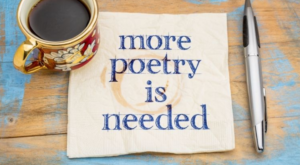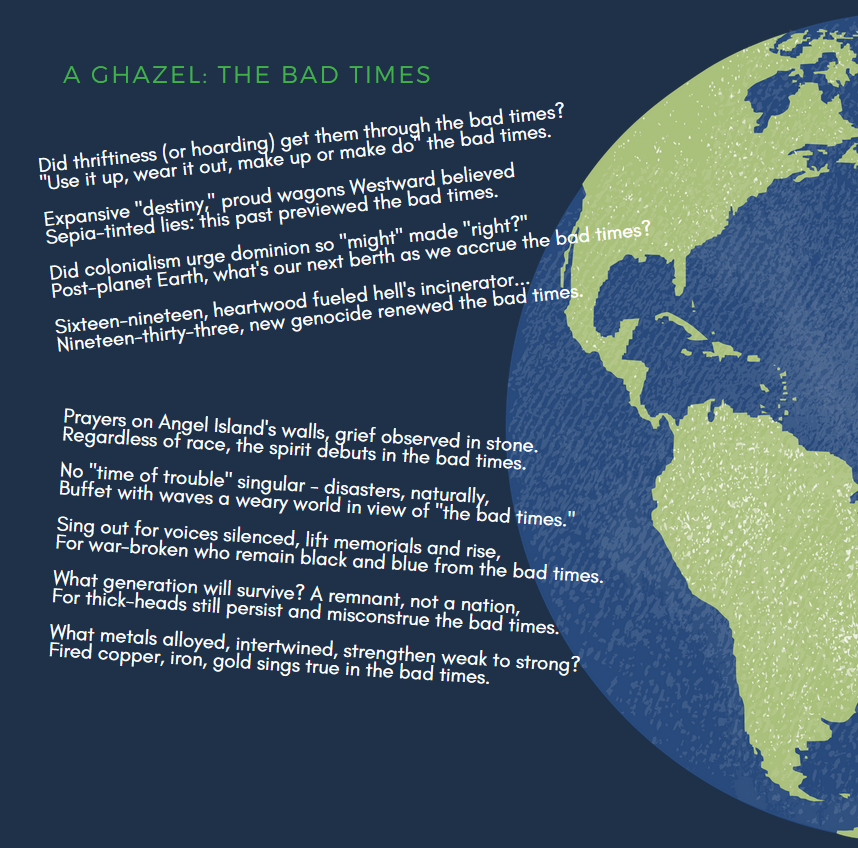Greetings! Welcome to another Poetry Peeps adventure on Poetry Friday!
Poetry Peeps! You’re invited to our challenge in the month of June! Here’s the scoop: we’re writing in response to a quotation. Ours is an excerpt from Robin Wall Kimmerer’s Braiding Sweetgrass, p. 359, in the chapter “People of Corn, People of Light:” “If grief can be a doorway to love, then let us all weep for the world we are breaking apart so we can love it back to wholeness again.” How does that strike you? This time, the form and way you use this quotation – or another one which strikes your fancy – is totally up to you, but the Poetry Sisters are continuing with our 2023 theme of TRANSFORMATION. You have a month to craft your creation and share it on June 30th in a post and/or on social media with the tag #PoetryPals.
I feel like a dropped mirror – seven years of indifferent luck and little shards of self reflecting any number of different realities. This revision has just wrung me out – but in a better way than I had any right to expect of a novel outline done in a fit of pique that took me deeper than I expected. Himself sat patiently with me the times I completely wigged out and moaned aloud that I was never going to finish this on time. (I did. I always do. I always have. What is work, if you can’t be really dramatic about it, though?)
Oddly, all of this feels like really good prep for doing a ghazel.
No, seriously.
The #1 hardest thing for me to …embody in this couplet form is a sense of disjointedness. No, you’re not telling a story. No, you’re not pulling together the unified theory of anything. No, you’re not supposed to create an ensemble performance. Agha Shahid Ali, the poet who edited Ravishing DisUnities: Real Ghazals in English, in his foreword compared each ghazal couplet to “a stone from a necklace,” which should continue to “shine in that vivid isolation.” Sara had a great idea when she suggested we think of it as a new “13 Ways of Looking at a Blackbird,”, by Wallace Stevens. That’s the level of splintered we’re going for – and while I’ve been working the past several months on being able to be … loose with words and wordplay, this was still quite a challenge. Dabbling in Neruda last month helped create a feeling of voluptuous abandon with words. This month, I wanted less to luxuriate, and more to make clockwork, ticking along with a limited pas de deux, each couplet touched and spinning perfectly for just a moment…
Well, that was the idea, anyway.
After writing THREE of the bloody things, each one more hated than the last, I took Marilyn Hacker’s “Dark Times” as my mentor text, and tried again… I only lightly kept to our transformation theme, but I tried to order the couplets from darkness into light, or at least from skies of gray to deeper shades of blue.
“Bad Times”
Did thriftiness (or hoarding) got them THROUGH the bad times?
“Use it up, wear it out, make up, or make do” the bad times.
Expansive “destiny,” proud wagons Westward believed
Sepia-tinted lies: this past previewed the bad times.
Did colonialism urge dominion, so might made right?
Post-planet Earth, what’s our next berth, as we accrue the bad times?
Sixteen-nineteen, heartwood filled hell’s incinerator
Nineteen-thirty-three new genocide renewed the bad times.
Prayers on Angel Island’s walls, grief observed in stone.
Regardless of race, the spirit debut in the bad times.
No “time of trouble” singular – disasters, naturally,
Buffet with waves a weary world in view of the bad times.
Sing out for voices silenced, lift memorials, and rise,
For those war-broken who remain black and blue from the bad times.
What generation will survive? A remnant, not a nation
For thick-heads still persist and MISCONSTRUE the bad times.
What metals alloyed, intertwined strengthen weak to strong?
Fired copper, iron, gold sings TRUE in the bad times.
There’s always more poetry. Sara brought this to the table. And here’s Laura’s. Tricia’s poem is here, and Liz’s poem is here. Mary Lee’s lakeside ghazel is here, while Michelle K. joined the challenge here. Heidi’s ghazal is right here. More Poetry Peeps will be checking in throughout the weekend, so don’t forget to come back and read the whole roundup. Meanwhile, Poetry Friday is hosted today by Patricia at Reverie. Thanks, Patricia!
A Buddhist koan about life after enlightenment says that “A broken mirror never reflects again; fallen flowers never go back to the old branches.” Well, I’ll respectfully disagree – of course a broken mirror still works! It merely reflects different pieces of the same sky, which is both a kind of clarity and a kind of distance I think I can live with. And if you’re feeling a little broken, a little blurry, taped-together, and wonky, don’t worry, friends. You’re not alone. ♥
Pax.


“A remnant, not a nation” such a powerful line with a pull at your heart summation but true…Looking for a minuscule bit of shine from your last stanza—thanks Tanita from a too full month filled with moving my almost 90 year old mom, unpacking her, tying together closing near catastrophes, whilst prepping for summer classes and teaching spring classes…
TANITA!! I have shivers over what you did with the rhymes here — this is so fine!!
(Oh, and I love (am heartbroken by) “a remnant, not a nation”…)
Well, if we’re going to acknowledge the times of trouble plural, let’s do with a poem like this to alloy and steel ourselves for the work they demand! My favorite stanza is “Sing out,” with its black and blue rising. Go on, Cousin Tanita!
Woohoo! I finally convinced WordPress that I actually belong here!
First, I posted a link to my poem at the beginning of the week in Slack, so you may not have seen it, but I did get it done!
Second, this is heartbreaking and beautiful at the same time.
Third, the first stanza has my depression-era grandmother written all over it. Hers was just the first voice I heard in this poem. There are so many others.
Thank you for wrestling with this form and giving us so much to consider.
What?! There’s no good old days? Said with a sour-faced “ha!” This is lovely and powerful, Tanita. And my sort of allegory picture book that’s coming out next year was originally (though no longer) called Perfectly Broken. I liked that title so much, but it didn’t have enough reader appeal and didn’t make enough sense until the end of the book. So…no. But we’re all broken. And there is still sky and reflecting and beauty.
I like your thought about the broken mirror yet it is also dismaying that those flowers do not return. . . Your poem encompasses a broad swath that wanders through our history, a sad commentary that as you wrote: “as we accrue the bad times?” I like the spirit, though, at the end, Tanita, the touch of strong metal. Will we keep it?
Like Sara, I thought about how different groups define “the bad times” differently as I read this. I love the emphasis on the words through/misconstrue/true: again, different and varied takes on the bad times.
And I love that final line. What a challenging form! Thanks for sharing your process on this one. I always enjoy and learn something from the way you tackle various forms.
I love the glimmer of a turn when “the spirit debut” and then the full turn of “Sing out for voices silenced, lift memorials, and rise,” because DANG that was a list of bad times! Just when it seems like we’re made of nothing but, you bring on the forge. This is so. very. powerful. And “TRUE.”
Tanit, Congratulations on meeting your deadline and thanks for your thoughts on the ghazel: “The #1 hardest thing for me to …embody in this couplet form is a sense of disjointedness.” This format is new to me but I would like to try it. Perhaps, I will be able to squeeze in some time between all the family events waiting for me. I do like the questions you asked. They make me think deeply about disjointedness. Thanks for next month’s challenge.
What is it about this form that lends itself to asking questions? You ask deep ones, and your splinters (ouch, sharp!) plus the repetition of “bad times” leave me thinking about what that phrase means to different people, who gets to say which times were bad and for whom… These ghazals really pull their weight, don’t they?
THROUGH, MISCONSTRUE, TRUE — the might be the reality of how any of us deal with “bad times” — but your ending is a powerful reminder: we are forged like fired copper, iron, gold — which is why I agree: a broken mirror is still a mirror. Thank you for working all this out, Tanita, and sharing it with us.
(Patricia)